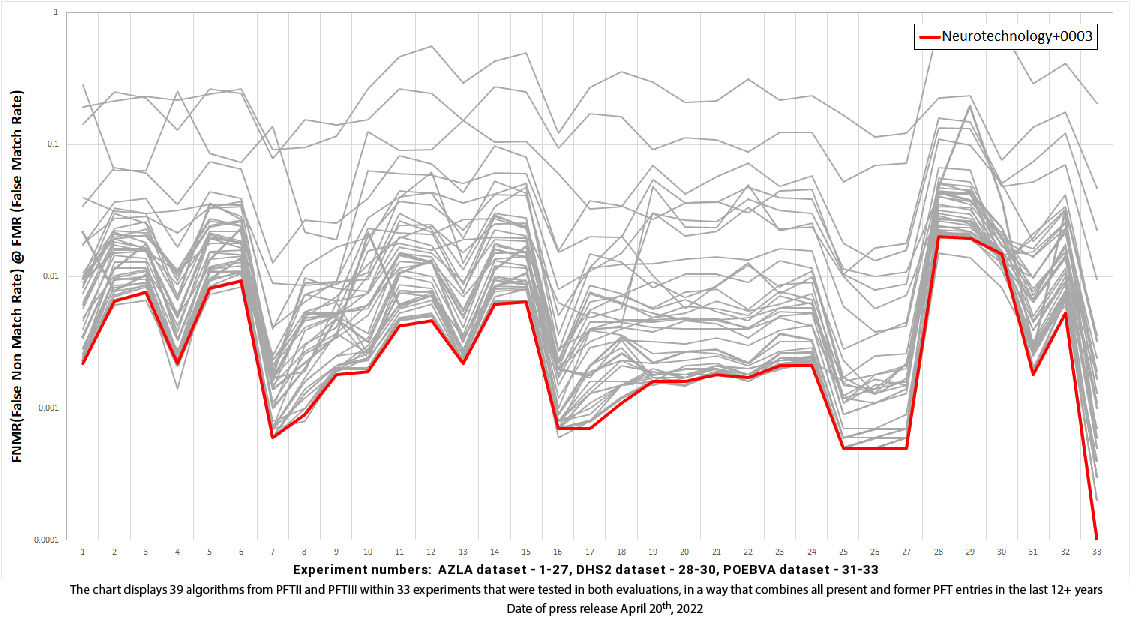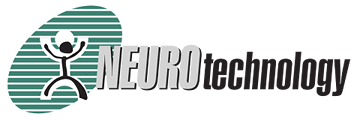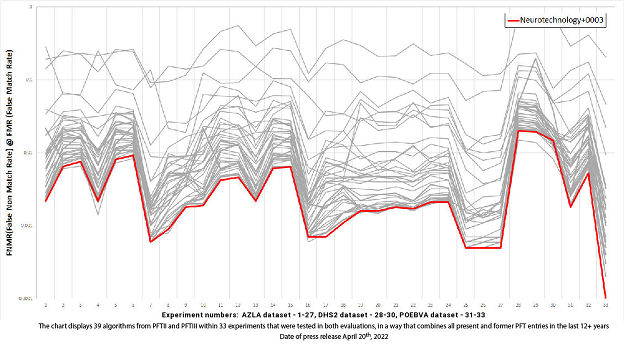Press Release
Neurotechnology's Fingerprint Recognition Algorithm Maintains Number One Ranking in NIST PFT III Evaluation
The proprietary fingerprint extraction and matching algorithm is ranked as the most accurate overall in all fingerprint verification benchmarks.
Vilnius, Lithuania – April 20, 2022 – Neurotechnology, a provider of deep learning-based solutions and high-precision biometric identification technologies, today announced that the company has confirmed the first place position in the NIST Proprietary Fingerprint Template (PFT) III evaluation results released on March 7, 2022. Since 2019, Neurotechnology's fingerprint recognition algorithms have held the number one position in NIST PFT evaluations as the company has continued to innovate and improve both the speed and accuracy of their biometric algorithms.
The highly accredited National Institute of Standards and Technology (NIST) has, with its Proprietary Fingerprint Template (PFT) evaluation, provided the largest and most recognized ongoing assessment of fingerprint verification available today. Since fingerprint templates are not necessarily standardized across all vendors, each algorithm developer uses their latest technology to showcase the full potential of their individual algorithms. Neurotechnology's top position in PFT III demonstrates the fully enhanced capabilities of the company's latest R&D advancements.
The Proprietary Fingerprint Template evaluation determines the algorithmic capabilities of one-to-one fingerprint verification and assesses the accuracy of final stage fingerprint matchers used in one-to-many Automated Fingerprint Identification System (AFIS) searches. The most recent generations of the PFT evaluation cover:
- PFT II: one-to-one fingerprint verification evaluation. Active between 2010 and 2019, PFT II was used to evaluate plain versus plain, plain versus rolled, and rolled versus rolled fingerprint verification scenarios and reported template extraction times, template sizes, and match times.
- PFT III: the continuation of the previous PFT generation evaluations now includes several PFT III-specific datasets.
To provide a more comprehensive comparison of algorithmic function, NIST included in this current evaluation the accuracies that were being tested in the PFT 2003 and PFT II evaluations. This process provided a comparison of the algorithm submissions across all current and former PFT evaluations.
"It is challenging to continuously improve your technology when it is already outperforming all others in the industry, but our team has continued to demonstrate a spirit of innovation, and we are thrilled to see the latest algorithm improve our leading scores even further," said Evaldas Borcovas, biometric research lead at Neurotechnology. "NIST is regarded as the most influential and respected organization evaluating biometric algorithms, and their highest evaluation of our technologies shows that our fingerprint algorithm is the most reliable and accurate algorithm available."

While Neurotechnology's previous fingerprint algorithm had already been judged the most accurate in fingerprint recognition evaluations, the newest submission for PFT III demonstrated an even greater performance according to the algorithm's average ranking across all experiments. Both PFT II and PFT III evaluations included 33 experiments. The results were compared against 39 algorithm submissions from 22 vendors. The final results took into account the following datasets:
- The first 27 experiments ran against the combined datasets from the Arizona Department of Public Safety and the Los Angeles County Sheriff's Department (AZLA). Numbers 1 to 9 evaluated plain-to-plain, 10 to 18 looked at plain-to-rolled, and 19 to 27 judged rolled-to-rolled fingerprint matching.
- The Dataset of Department of Homeland Security (DHS2) was used for experiments 28 to 30 that again looked at plain-to-plain fingerprint matching.
- The Combined datasets of U.S. VISIT Point of Entry Data with Bio-Visa Application (POEBVA) were used in the last 3 experiments that were plain-to-plain fingerprint matching tests.
Neurotechnology has proven to be a highly-evaluated vendor of multibiometric solutions. Its proprietary algorithms have demonstrated the highest accuracy and reliability in various NIST evaluations. Achievements in the field include:
- MINEX III: a continuous test of fingerprint templates ensuring that template generators and matchers are in compliance with the US government's Personal Identity Verification program. Neurotechnology's algorithm has been in the top of the most accurate and interoperable algorithms in the industry for several years running, with only a few vendors achieving similar results in either category.
- IREX 10: assessment of iris recognition performance for identification applications. In more than 10 years of participation, Neurotechnology's submissions have consecutively shown strong results among an increasing number of participants.
- FRVT: the most reliable series of large-scale, independent evaluations for face recognition algorithms in verification and identification scenarios. Across numerous FRVT evaluations, Neurotechnology's latest algorithm was among the top 3% when judged against several hundred submissions.
- SlapSeg III: evaluates fingerprint slap segmentation performances across all types of finger slap scanning methods. Neurotechnology's submissions appeared among the top positions in all different scanning techniques, including live and paper scans.
For more information about Neurotechnology's entire product line, please visit: neurotechnology.com
About Neurotechnology
Neurotechnology is a developer of high-precision algorithms and software based on deep neural networks and other AI-related technologies. Currently, more than half of the company employees are actively involved in research and development, continuously improving proprietary algorithms. Extensive industry knowledge and expertise gathered throughout 30 years of experience in the field enable the company to maintain top positions in NIST testing results. Neurotechnology solutions are used around the globe on national-scale projects, including the world's largest biometric database, India's Aadhaar ID program, and ensuring electoral integrity during the elections in Ghana and DR Congo.
Media Contact
Jennifer Allen Newton
Bluehouse Consulting Group, Inc.
+1-503-805-7540
jennifer (at) bluehousecg (dot) com

